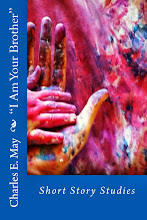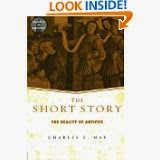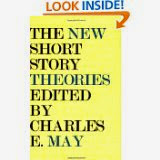The pressure on writers by agents, editors, and critics to abandon the short story as soon as possible and do something serious with their lives--such as write a novel--is unrelenting. This narrative bias that bigger is better persists in spite of the fact that the faithful few who have largely ignored it are among the most critically acclaimed writers of the twentieth century: Anton Chekhov, Jorge Luis Borges, Flannery O'Connor, Peter Taylor, Alice Munro, Grace Paley, Donald Barthelme, Raymond Carver.
Two new biographies released in the last couple of weeks remind us of this fact and raise a central issue about the short story that I would like to discuss briefly, as usual, hoping to create some conversation among my readers.
Both Hiding Man: A Biography of Donald Barthelme, by Tracy Daugherty (St. Martin’s Press) and Flannery: A Life of Flannery O’Connor by Brad Gooch (Little, Brown) have been reviewed in many of the “high places”: New York Times, Los Angeles Times, Washington Post, New Yorker, Wall Street Journal, etc., reminding us of two writers who, although they wrote the occasional novel, specialized in the short story.
So what does it mean to specialize in the short story? Is there something about the craft or technique of the short story that attracts certain writers? Or is there something about the thematic focus of the short story that seems special to the form and irresistible to certain writers?
The short story's dependence on a tightly controlled structure rather than a linear plot and mimetic methods has been one of its central aesthetic characteristic since Poe adapted from Augustus William Schlegel a new meaning of the term plot as being "that from which no part can be displaced without ruin to the whole." By this one stroke, Poe shifted the reader's narrative focus from mimetic events to aesthetic pattern. However, the short story’s dependence on formal unity is not simply a product of Edgar Allan Poe's obsessive imagination, but rather a conventional characteristic deriving from the genre’s ancestry in myth and folklore.
As Frederic Jameson has reminded us, short tales have a kind of "atemporal and object-like unity in the way they convert existence into a sudden coincidence between two systems: a resolution of multiplicity into unity, or a fulfillment of a single wish.” It is a basic human wish that the short story perhaps fulfills better than the novel. According to Hayden White, we desire to have real events “display the coherence, integrity, fullness, and closure of an image of life that is and can only be imaginary. The notion that sequences of real events possess the formal attributes of the stories we tell about imaginary events could only have its origin in wishes, daydreams, reveries.”
Many years ago I argued that the short story “way of seeing” was like that which Ernst Cassirer says characterizes perceiving the world in a mythic way, for it means not distinguishing objective characters, but rather “physiognomic characters.” In this realm, says Cassirer, we cannot speak of things as dead or indifferent stuff, but all “objects are benign or malignant, friendly or inimical, familiar or uncanny, alluring and fascinating or repellent and threatening.” As Cassirer has suggested, the basis for the “short-story way of seeing” is not a substratum of thought but of feeling. This is also what John Dewey means by the difference between “experience” and “an experience.” An emotionally charged experience phenomenologically encountered, rather than "experience" discursively understood, is the primary focus of the modern short story, and, as Dewey makes clear, "an experience" is recognized as such precisely because it has a unity, "a single quality that pervades the entire experience in spite of the variation of its constituent parts.”
Rather than plot or ideology, what unifies the short story is an atmosphere, a certain tone of significance. As Alberto Moravia has noted, when Chekhov tried his hand at a novel he was less gifted and convincing than he was with the short story. If you look at Chekhov’s long stories, says Moravia, you feel a lack of something that makes a novel, even a bad novel, a novel, for in them Chekhov dilutes his “concentrated lyrical feeling with superfluous plots lacking intrinsic necessity.” The very qualities that makes him a great short story writer become defects when Chekhov tackles a novel.
In his biography, Gooch says that O’Connor’s two novels Wise Blood and The Violent Bear It Away do not hold up as well as do her stories because O’Connor was not a novelist, but rather, as David Ulin echoes in his Los Angeles Times review, “perhaps the greatest 20th century American practitioner of the short story.”
So what made O’Connor stick to, and succeed in, the short story? Was it the formal control of the short story that appealed to her, or did her particular vision seem most appropriate to the short story?
Tracy Daugherty reminds us that although Donald Barthelme wrote novels and plays, he is still best known for his short stories.” The short story’s appeal to Barthleme is perhaps suggested by Menand, who reminds us in his New Yorker review that Barthelme thought the goal of writing was “access to the ineffable,” saying in a fiction seminar in 1975, “I believe that’s the place artists are trying to get to, and I further believe that when they are successful they reach it…an area somewhere probably between mathematics and religion, in which what may fairly be called truth exists.”
To understand what Barthelme attempted in his fiction; we should remember the pervasive postmodernist view that underlies it. For Barthelme, as well as for Robert Coover, John Barth, and William H. Gass, what is considered everyday reality is the result of a fiction-making process; reality is not so much ‘out there’ as it is created out of language and language like structures of various communication media. Thus literary fictions constitute an analogue of the means by which people create what they call reality. To write fiction is to engage self-consciously in the process by which reality is constructed, for the fiction writer makes the tacit explicit.
The primary effect of this mode of thought on contemporary fiction is that the story tends to loosen its illusion of reality to explore instead the reality of its own illusion. Rather than presenting itself as if it were real—a mimetic mirroring of external realty—postmodernist fiction often made its own artistic conventions and devices the subject of the story as well as its theme. The basic problem with such fiction is that it is often called “unreadable,” for readers are unaccustomed to having those fictional conventions which are usually invisible suddenly laid bare, foregrounded, and manipulated by the author.
The short story seems a more appropriate form for Barthelme’s vision than the novel, for historically the short form has been less bound to the conventions of realism than the long form. The short story has also always been more aligned with the spatial techniques of poetry than the novel.
The basic issue overshadowing the work of Barthelme seems to me to be this: If reality is itself a process of fictional creation by metaphor-making man, then the modern writer who wishes to write about “reality” can truthfully only write about that very process. However, to write about this process is to run the risk of dealing with language on a level that leaves the reader gasping for something intangible and real, even if that reality is only an illusion.
So, what do you think? Is there a style or vision characteristic of the short story that draws certain writers to the form, in spite of the fact that their agents and publishers beg them to write novels?




